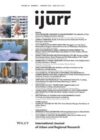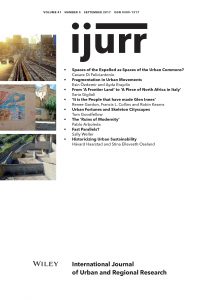Volume 41 Issue 5 September 2017
In This Issue
Struggles over urban commons take various forms, as do attempts to turn them into exclusive and profitable investment schemes. As urban space has increasingly become a site of capital investment and accumulation, many cities in both the global North and South are marked by a process of ongoing uneven development. The diverse practices associated with this process, their devastating effects on the less privileged urban populations, and their manifestations in the built environment are once again documented and conceptualized in the pages of IJURR in this issue. State-led transformation projects, neoliberal rationalities, policy mobilities, rent seeking speculative ventures and austerity policies are some of the factors that contribute to this uneven production of urban space. So are ethnic conflicts, practices of othering and deliberate discursive strategies that divide, mark and stigmatize certain groups by selectively appealing to history, heritage, community or social mixing. Gentrification and displacement, spatial segregation and lack of affordable housing, abandoned public works that were once seen as signs of modernization are some of the manifestations of these practices in the built environment. But these practices also generate unruly ones that resist and contest this form of city making. What are the challenges facing such struggles? How can urban scholars develop theoretical and methodological tools that will help them expose the forces behind ongoing uneven development in cities, their effects on urban populations, and their contestation through various forms of political mobilization?
— Mustafa Dikeç
Articles
Spaces of the Expelled as Spaces of the Urban Commons? Analysing the Re-emergence of Squatting Initiatives in Rome
Published online on Oct 4th, 2017 | DOI: 10.1111/1468-2427.12513 (p 708-725)
Fragmentation in Urban Movements: The Role of Urban Planning Processes
Published online on Oct 4th, 2017 | DOI: 10.1111/1468-2427.12516 (p 727-748)
From ‘A Frontier Land’ to ‘A Piece of North Africa in Italy’: The Changing Politics of ‘Tunisianness’ in Mazara del Vallo, Sicily
Published online on Oct 26th, 2017 | DOI: 10.1111/1468-2427.12544 (p 749-766)
‘It is the People that Have Made Glen Innes’: State-led Gentrification and the Reconfiguration of Urban Life in Auckland
Published online on Oct 26th, 2017 | DOI: 10.1111/1468-2427.12569 (p 767-785)
Urban Fortunes and Skeleton Cityscapes: Real Estate and Late Urbanization in Kigali and Addis Ababa
Published online on Oct 26th, 2017 | DOI: 10.1111/1468-2427.12550 (p 786-803)
‘Ruins of Modernity’: The Critical Implications of Unfinished Public Works in Italy
Published online on Oct 24th, 2017 | DOI: 10.1111/1468-2427.12569 (p 804-820)
Fast Parallels? Contesting Mobile Policy Technologies
Published online on Oct 30th, 2017 | DOI: 10.1111/1468-2427.12545 (p 821–837)
Historicizing Urban Sustainability: The Shifting Ideals Behind Forus Industrial Park, Norway
Published online on Oct 26th, 2017 | DOI: 10.1111/1468-2427.12551 (p 838-854)
Book Reviews
Margit Mayer, Catharina Thörn and Håkan Thörn (eds.) 2016: Urban Uprisings: Challenging Neoliberal Urbanism in Europe. London: Palgrave Macmillan
Published online on Oct 27th, 2017 | DOI: 10.1111/1468-2427.12558 (p 855-856)
Walter J. Nicholls and Justus Uitermark 2017: Cities and Social Movements: Immigrant Right Activism in the United States, France, and the Netherlands, 1970-2015. Chichester, West Sussex: Studies in Social and Urban Change series, Wiley-Blackwell
Published online on Oct 27th, 2017 | DOI: 10.1111/1468-2427.12559 (p 856-858)
Amy Starecheski 2016: Ours to Lose: When Squatters Became Homeowners in New York City. Chicago: University of Chicago Press
Published online on Oct 27th, 2017 | DOI: 10.1111/1468-2427.12560 (p 858-859)
Costis Hadjimichalis 2014: Κρίση χρέους κ[alpha]ι εκποίηση [gamma]ης [Debt Crisis and Land Dispossession]. Athens: ΚΨΜ Publications
Published online on Oct 27th, 2017 | DOI: 10.1111/1468-2427.12561 (p 859-861)
Andrey Makarychev and Alexandra Yatsyk (eds.) 2016: Mega Events in Post-Soviet Eurasia: Shifting Borderlines of Inclusion and Exclusion. New York: Palgrave Macmillan
Published online on Oct 27th, 2017 | DOI: 10.1111/1468-2427.12562 (p 862-863)
Nikhil Anand 2017: Hydraulic City: Water and the Infrastructures of Citizenship in Mumbai. Durham, NC: Duke University Press
Published online on Oct 27th, 2017 | DOI: 10.1111/1468-2427.12563 (p 863-866)
Issues in this volume
January 2017
March 2017
May 2017
July 2017
September 2017
November 2017

